It might be strange for some, but coconut oil on tattoos is actually a thing. There are so many benefits to using coconut oil, not just for tattoos and skincare in general, but also in the kitchen and around the home. From babies to the elderly – and even our pets – coconut oil has a plethora of uses for everyone. That said, here’s why coconut oil works great on all sorts of tattoos – from unhealed to decades-old tatts!
Page Contents
- Why use coconut oil on tattoos?
- 1. Coconut oil is an excellent moisturiser
- 2. It’s a powerful antioxidant
- 3. It can fight off infection
- 4. Coconut oil is anti-inflammatory
- 5. 100% natural
- 6. Extremely cost-effective
- 7. It’s a highly versatile product
- 8. Coconut oil is hypoallergenic
- 9. Great for use at any time during your tattoo journey (except while tattoo is weeping)
- 10. It’s widely available
- The downsides of using coconut oil on tattoos
- Is it safe to use coconut oil-based aftercare products instead of 100% virgin coconut oil?
- How to apply coconut oil on tattoos
- Conclusion
Why use coconut oil on tattoos?
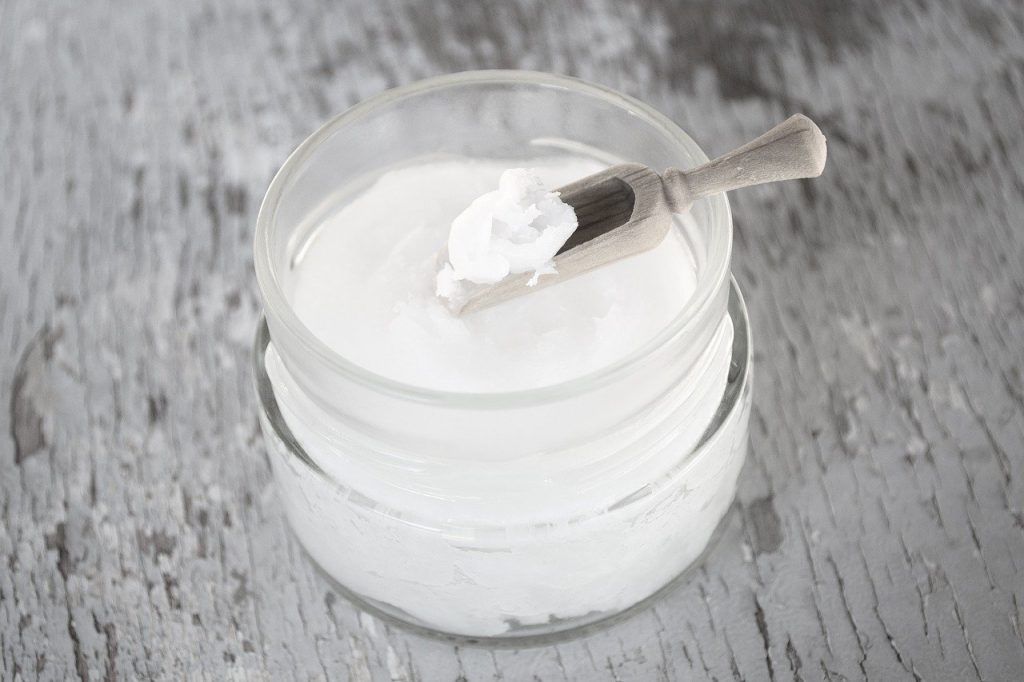
Coconut oil on wooden spoon (Photo by DanaTentis)
If you’re still undecided about using this miracle oil for your tattoos, then you should read this entire section. Hopefully, these 10 reasons will help sway you over to the coconut-loving side!
But first, here’s an infographic showing a brief summary of why coconut oil is the perfect aftercare product for tattoos:
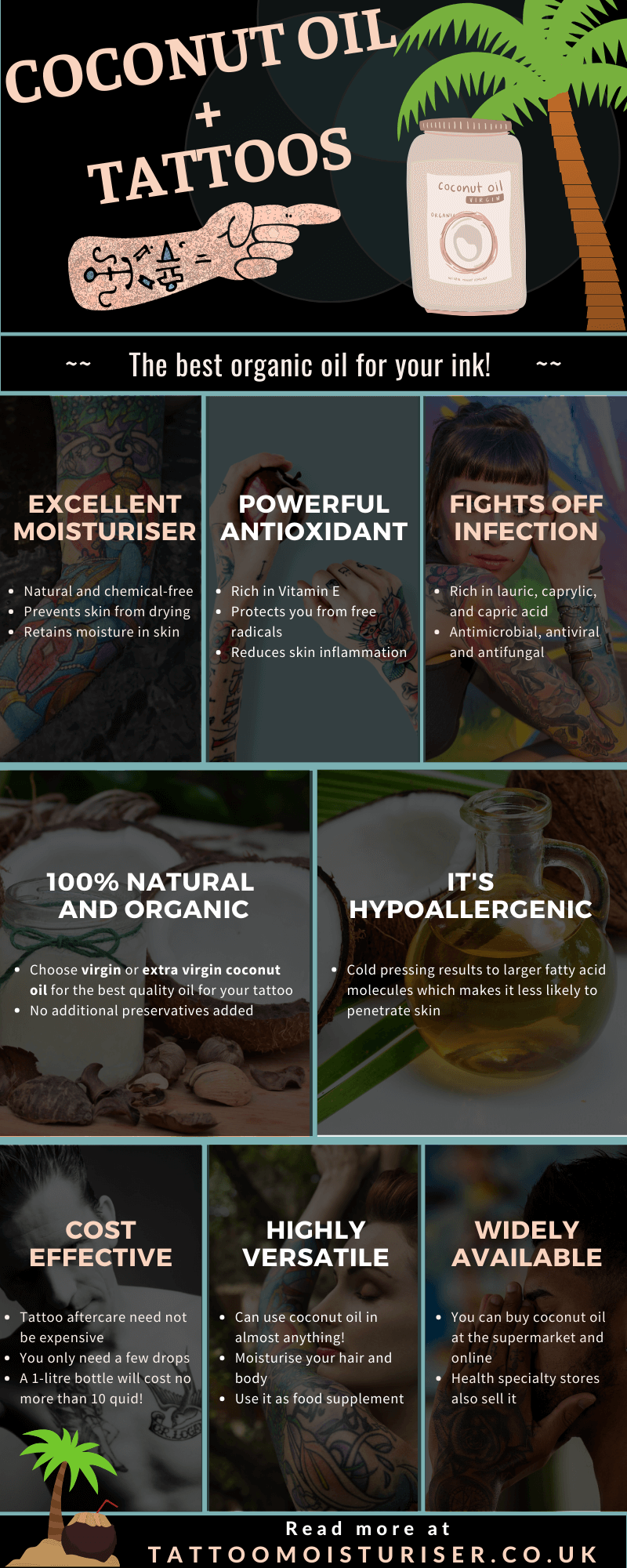
Read on to know more about the awesome benefits of coconut oil on skin!
1. Coconut oil is an excellent moisturiser
Coconut oil is a great, chemical-free moisturiser that can do wonders for your skin. The oil is rich in vitamin E and medium-chain fatty acids (it’s the healthy kind, don’t worry). When applied to tattoos, it prevents the skin from drying up and cracking by retaining the moisture within.
As a side note, coconut oil even offers relief for eczema. There’s no known cure for this skin condition yet, but coconut oil’s been proven to help get symptoms under control.
So, if you suffer from eczema, you’ll essentially be hitting two birds with one stone by using coconut oil. You’ll be moisturising your tattoo, and at the same time, relieving your eczema symptoms!
2. It’s a powerful antioxidant
As you’ve read above, coconut oil is rich in vitamin E which is a powerful antioxidant. Antioxidants basically protect you from free radicals, a.k.a. oxidants, found in your body and the environment.
These free radicals react with molecules in your body and cause inflammation and disease. Fortunately, antioxidants abound in nature – with coconut oil being a key source.
Here’s a succinct explanation of how oxidants (free radicals) and antioxidants work:
The best way to combat free radicals from harming your tattoo – and your health in general – is by eating foods rich in antioxidants, such as coconuts and their derivatives. If you turn out to be allergic to coconuts, don’t fret. There are still plenty of fruits and vegetables to choose from!
3. It can fight off infection
Tattoo infections aren’t all that rare. After all, tattoos are technically puncture wounds in the skin. The larger the tattoo, the larger the wound, and the larger the area that’s at risk of getting infected. If you’re not careful, you can easily introduce germs and bacteria to your tattoo.
Fortunately, coconut oil is rich in lauric, caprylic and capric acid, which have antimicrobial, antiviral, antifungal, and other immune system-boosting properties. Of course, prevention is better than cure so it’s better to apply coconut oil on tattoos BEFORE infection sets in.
Since you can’t exactly predict when you’ll get an infection, it’s best to be prepared and just apply oil on your unhealed-but-no-longer-weeping tattoo. Additionally, you can also ingest a tablespoon or two on a daily basis to help strengthen your immune system.
4. Coconut oil is anti-inflammatory
Brand-new tattoos are especially prone to inflammation. While we don’t suggest putting coconut oil on still-weeping tattoos, you can start applying a thin layer (a few days after getting inked) to help relieve inflammation.
Thanks to its fatty acid components, coconut oil can help enhance its protective barrier functions (great for letting your tattoo heal underneath). At the same time, its anti-inflammatory properties will help your skin return to normal quickly.
5. 100% natural

You can eat coconuts, drink coconut juice and oil, and more! (Photo by Jessica Wilson)
Coconut oil extraction methods may vary (which leads to differences in quality), but the undeniable fact remains that it’s 100% natural. Now, some of the most common ways to extract oil from coconut meat (the white flesh inside the shell) include cold pressing, fermenting, and centrifuge separation.
For tattoos, I highly recommend you use virgin, extra virgin or unrefined coconut oil to ensure the best quality (in terms of nutrients, colour and taste).
You want to avoid refined, bleached and deodorised coconut oil as these are usually extracted from dried copra. These are sold very cheaply in most places, and I wouldn’t recommend you get them by virtue of it being more affordable than unrefined varieties.
6. Extremely cost-effective

Unlike traditional tattoo aftercare products which can seriously eat into your household budget, pure coconut oil is very much affordable. Coconut oil-based aftercare products will understandably be a bit more expensive, but that’s only because manufacturers do add other ingredients to the mix.
The point is that tattoo aftercare – and maintenance – need not be expensive. An entire litre of pure, raw virgin coconut oil will cost you no more than 10 quid! And since a drop or two is all you need to moisturise your tattoo on a daily basis, your 10 quid will last you a long while – maybe even a couple of years!
7. It’s a highly versatile product

Image by mohamed Hassan
You can use coconut oil on literally anything! From moisturising your tattoo to your entire body – and even eating it as food supplement – coconut oil does it all. You can use it to remove your makeup, replace diaper cream with it, soothe irritated skin, turn it into homemade soap, and so much more!
A small jar of coconut oil can go a long way. Not a single drop will ever be wasted because if you pour a bit too much, you can always use it in some other way!
8. Coconut oil is hypoallergenic
Virgin coconut oil (the kind used in skincare products) is extracted by pressing coconut meat. This method results in larger fatty acid molecules, which in turn makes VCO less allergenic (the larger molecules make it less likely to penetrate skin).
The only downside is, of course, you don’t exactly know how companies process their oils. For instance, if they’re mixing or storing coconut oil with other ingredients that are known allergens, then it will contaminate the coconut oil and transform it into an allergenic substance.
But, by itself, pure and unrefined virgin coconut oil is non-allergenic and non-irritating. It also won’t clog your skin’s pores because it’s supposedly non-comedogenic. Generally speaking, unrefined coconut oils are safe to use for all skin types.
9. Great for use at any time during your tattoo journey (except while tattoo is weeping)
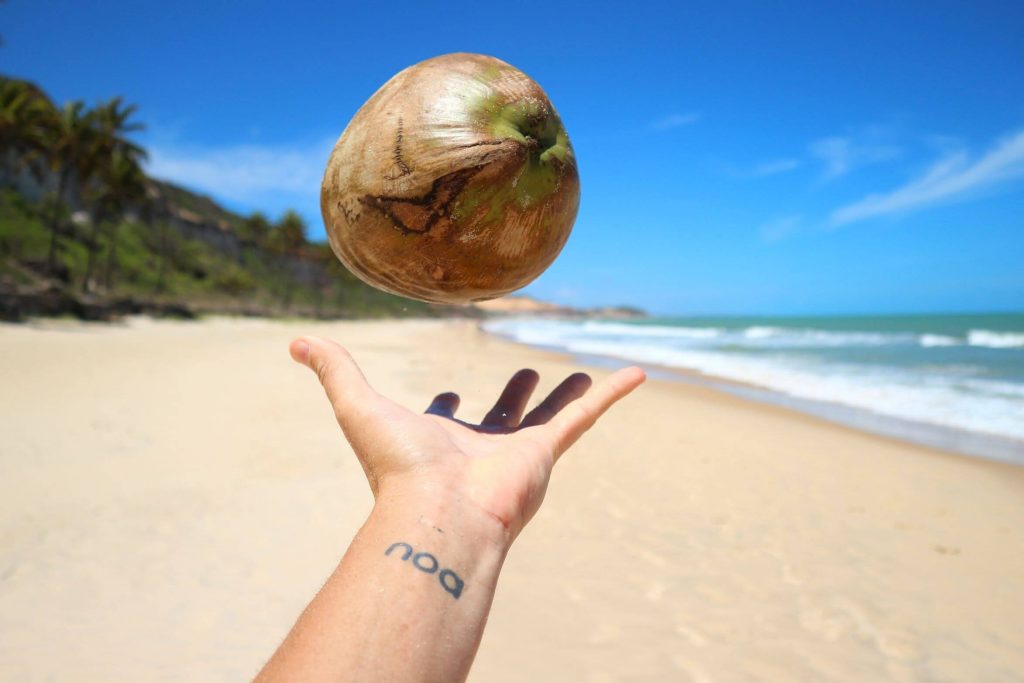
Photo by Chema Photo
You can apply coconut oil at all stages of the tattoo healing journey. For best results, however, you should start putting oil a few days before your appointment. It’s also advisable to drink lots of water to hydrate your skin.
This water-and-coconut-oil combo will make your skin a whole lot easier to tattoo on. Hydrated skin is also more likely to retain ink better than dry skin. Additionally, healthy skin will make the tattoo healing process faster, too.
That said, you may apply coconut oil as soon as your brand-new tattoo stops weeping. Some people say it’s fine to apply some oil even on still-weeping tatts, but I say it’s better to err on the side of caution, especially if the tattooed area is quite large.
The last thing you want to happen is a tattoo infection. It *may* be fine to apply some oil on a single-inch outline tattoo, but any bigger, and I’d hesitate. Lastly, since it’s very much an effective moisturiser, you can pretty much use coconut oil on your tattoo forever!
10. It’s widely available
Once you get a tattoo, you’ll be obligated to apply lotion or moisturiser on it every single day. If you’re not the type to take skincare seriously, then you’re up for some surprise – your tattoo will soon stop looking good if you don’t moisturise properly!
Click the image to buy this brand on Amazon!
Fortunately, coconut oil is widely available. You can find it in many places like in supermarkets, health speciality stores, and when all else fails, Amazon. If you run out, just go online and buy a jar or two!
The downsides of using coconut oil on tattoos
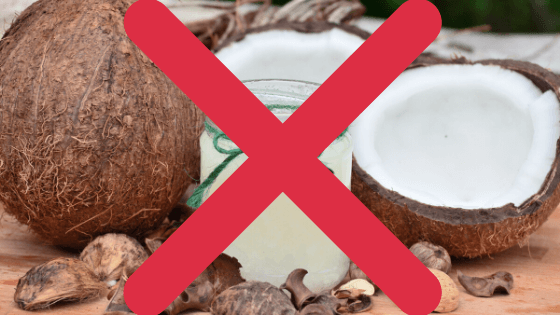
Honestly, coconut oil is such a great natural aftercare product, I found it hard to come up with a list of negative things to say about it. But alas, it’s not perfect, at least for some people. Here’s why:
People allergic to coconut oil can’t use this
There’s no specific number, but according to my research, coconut oil allergies aren’t as common as, say, peanut allergies. However, if you’re one of the unfortunate ones, then you’re out of luck. You’ll be missing out on the entire list of coconut oil benefits, not just on your tattoo but on your entire body!
So, how do you know if you’re allergic to coconut oil?
Well, if you present these symptoms after touching some oil or eating it, then you could be allergic:
Mild symptoms include nausea, itching, hives, vomiting, and diarrhoea. If you experience wheezing and trouble breathing, you might be experiencing an anaphylactic reaction – present yourself to the A&E immediately!
There are far too many different varieties
Remember, not all coconut oils are processed the same way. Hot-pressed, cold-pressed, organic, refined, unrefined, fractionated, hydrogenated – so many options!
If you want the best quality, cold-pressed virgin coconut oil is the best kind of oil to use on tattoos. If you use refined oil like those extracted from copra, then you could very well end up allergic to it.
Is it safe to use coconut oil-based aftercare products instead of 100% virgin coconut oil?
There are plenty of tattoo aftercare products that use coconut oil as a base. Mixed with other potent ingredients, you can multiply the moisturising and skin healing properties of coconut oil! Such is the case with products like Coconut King Aftercare Balm and Hustle Butter Deluxe.
All these products work great on healing brand-new tattoos. The choice is yours as to which product you’ll like best. Check the comparison table below:
| Product | Picture | Ingredients | Size | Price |
|---|---|---|---|---|
| Coconut King Aftercare Balm | 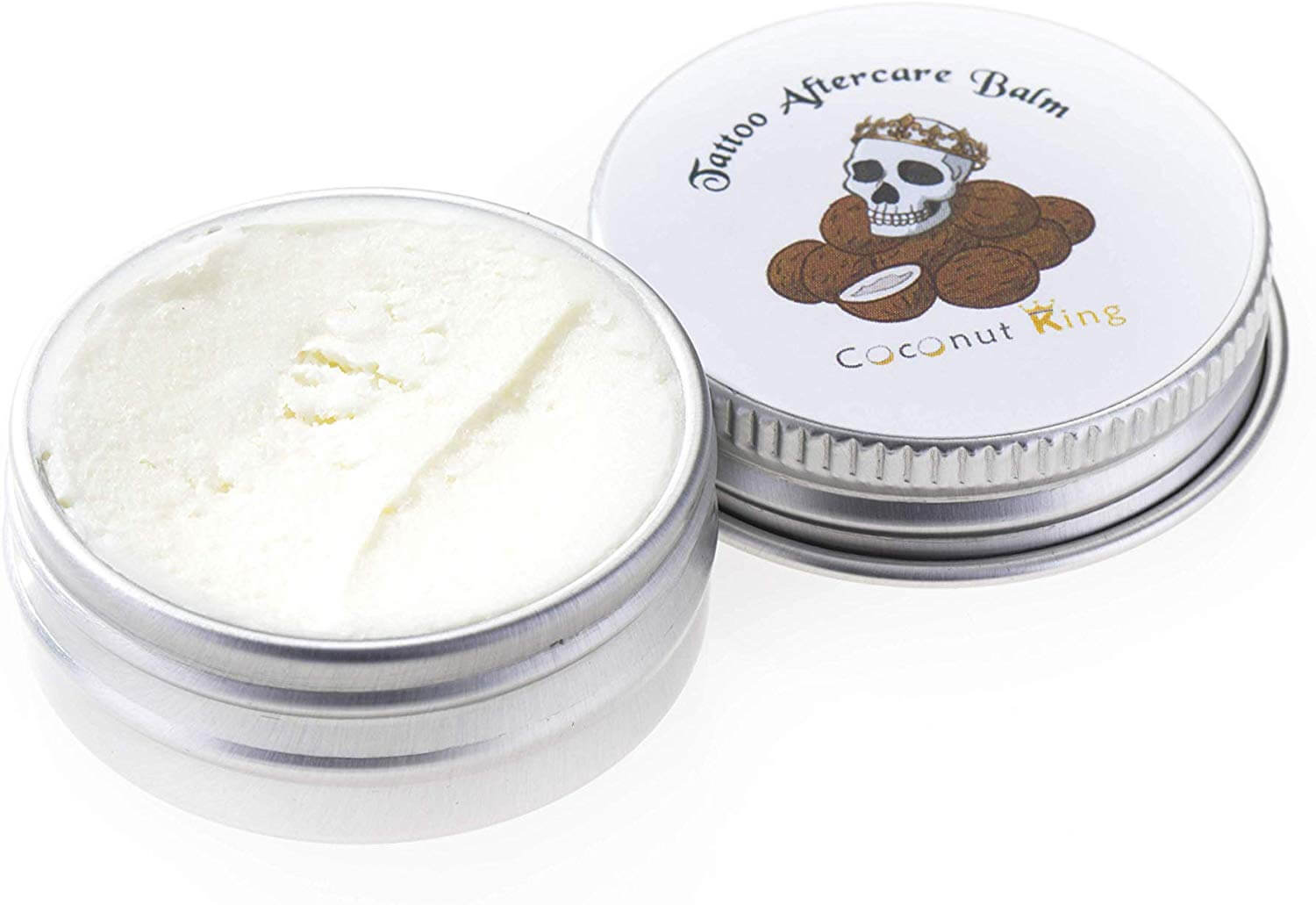 | Coconut oil, shea butter, mango butter, cocoa butter | 15ml, 60ml, 150ml | ££ |
| Hustle Butter Deluxe | 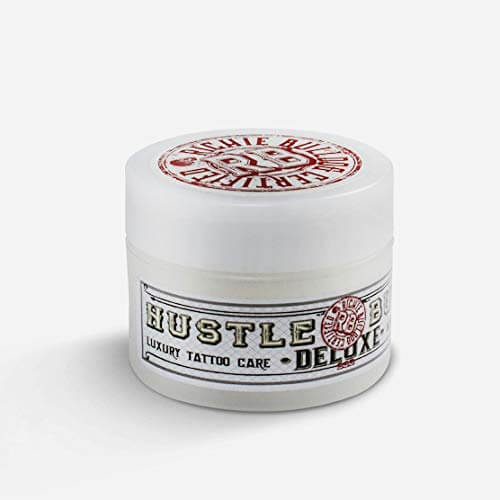 | Shea, mango and aloe butters, coconut, sunflower and rice bran oils, rosemary oleoresin, green tea, vitamin E complex & mint arvenis essential oil. With essence of papaya and coconut. | 30ml (1 oz) | £££ |
How to apply coconut oil on tattoos
Coconut oil is a natural product, but it doesn’t mean you can slather on a thick layer just because you feel like it. Here’s the proper way to apply coconut oil on skin:
Wash your hands

Before dipping your hands into your coconut oil jar, wash your hands first. You don’t want to contaminate the rest of the oil, or worse, infect your tattoo. Coconut oil does have antibacterial and antimicrobial properties, but it’s best not to tempt fate. After all, coconut is organic and can easily spoil if dirt is introduced to the jar.
Apply a very small amount and rub gently
It’s easy to get carried away and apply a thick layer of coconut oil on skin, especially when it’s frozen solid. If it’s cold, thaw out the oil first so it’s easier to apply. If you accidentally get too much, just spread it out over a wider expanse of skin. After all, it’s not just a tattoo moisturiser, it’s also a whole body moisturiser!
Repeat as often as necessary
Coconut oil will get absorbed into the skin after some time. Once you start feeling like your skin’s starting to dry up, then feel free to re-apply. Again, coconut oil is 100% natural, and if you’re not allergic to it, you should not run into any issues if you re-apply frequently.
Conclusion
If you’re still searching for the best natural aftercare product, look no further than coconut oil. It’s a 100% natural moisturiser with exceptional healing properties – two characteristics that a healing tattoo needs. That being said, let’s make coconut oil on tattoos the next big thing in the tattoo community!

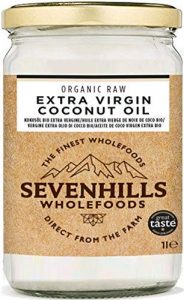
Thanks for sharing this information, it is very helpful for me as well as to my customers to make them understand.